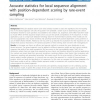Free Online Productivity Tools
i2Speak
i2Symbol
i2OCR
iTex2Img
iWeb2Print
iWeb2Shot
i2Type
iPdf2Split
iPdf2Merge
i2Bopomofo
i2Arabic
i2Style
i2Image
i2PDF
iLatex2Rtf
Sci2ools
BMCBI
2011
2011
Accurate statistics for local sequence alignment with position-dependent scoring by rare-event sampling
Background: Molecular database search tools need statistical models to assess the significance for the resulting hits. In the classical approach one asks the question how probable a certain score is observed by pure chance. Asymptotic theories for such questions are available for two random i.i.d. sequences. Some effort had been made to include effects of finite sequence lengths and to account for specific compositions of the sequences. In many applications, such as a large-scale database homology search for transmembrane proteins, these models are not the most appropriate ones. Search sensitivity and specificity benefit from position-dependent scoring schemes or use of Hidden Markov Models. Additional, one may wish to go beyond the assumption that the sequences are i.i.d. Despite their practical importance, the statistical properties of these settings have not been well investigated yet. Results: In this paper, we discuss an efficient and general method to compute the score distribut...
| Added | 12 May 2011 |
| Updated | 12 May 2011 |
| Type | Journal |
| Year | 2011 |
| Where | BMCBI |
| Authors | Stefan Wolfsheimer, Inke Herms, Sven Rahmann, Alexander K. Hartmann |
Comments (0)

